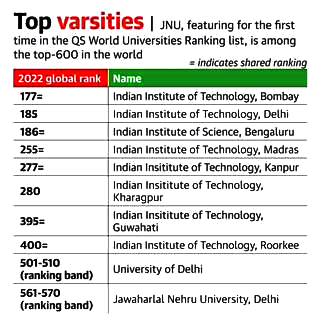Governance
QS World University Rankings 2022
- 09 Jun 2021
- 5 min read
Why in News
QS World University Rankings 2022 shows that India’s tally in the top 200 universities hasn’t changed for the fifth straight year.
QS World University Rankings
- Quacquarelli Symonds (QS) is a leading global career and education network for ambitious professionals looking to further their personal and professional development.
- QS develops and successfully implements methods of comparative data collection and analysis used to highlight institutions’ strengths.
- The ‘QS World University Rankings’ is an annual publication of university rankings which comprises the global overall and subject rankings.
- Six parameters and their weightage for the evaluation:
- Academic Reputation (40%)
- Employer Reputation (10%)
- Faculty/Student Ratio (20%)
- Citations per faculty (20%)
- International Faculty Ratio (5%)
- International Student Ratio (5%)
Key Points
- Global Rankings:
- Top Ranks:
- Massachusetts Institute of Technology (MIT) of the US is the top university for the 10th consecutive year.
- The University of Oxford (UK) has risen to second rank for the first time since 2006, while Stanford University (US) and the University of Cambridge (UK) share third spot.
- Asian Institutions:
- Singapore’s National University of Singapore and Nanyang Technological University, and China’s Tsinghua University and Peking University, are the only Asian universities in the global top 20.
- Top Ranks:
- Indian Institutions:

- Overall, there are 22 Indian institutions in the top 1,000 list compared to 21 in the 2021 Rankings, with the Indian Institutes of Technology (IITs) in Guwahati, Kanpur, Kharagpur and Madras making major strides in rankings.
- Jawaharlal Nehru University has entered the top 1,000 of the rankings for the first time, as its new undergraduate engineering programme now makes it eligible for the rating.
- IIT Bombay maintained its position as the top Indian institution for the fourth consecutive year, although it fell five places in the global rankings to the joint 177th position.
- IIT Delhi (185 rank) overtook the Indian Institute of Science, Bangalore (186 rank), giving India three institutions in the world’s top 200.
- IISc was also declared the world’s top research university by the indicator of most citations per faculty member, when adjusted for faculty size.
- India’s Performance:
- Indian universities have improved their performance on academic reputation metric and research impact, but continue to struggle on the teaching capacity metric.
- No Indian university ranks among the top 250 for faculty-student ratio.
- Poor performance on teaching capacity is not because of any drop in hiring, but rather an increased student intake mandated by the government to implement reservations for economically weaker sections.
- Indian universities have improved their performance on academic reputation metric and research impact, but continue to struggle on the teaching capacity metric.
- Concerns:
- No Objective Methodology:
- The rankings do not accurately reflect the quality of education in India, as they are largely dependent on international perception factors.
- Half of the score comes from reputation indicators which are based on perception, rather than any objective methodology.
- Manipulation:
- It is being blamed that this year’s improvement in scores was simply a manipulation of numbers by the rankings agency, driven by commercial pressures.
- No Objective Methodology:
- Related Indian Initiatives:
- Institutions of Eminence (IoE) Scheme:
- It is a government's scheme to provide the regulatory architecture for setting up or upgrading of 20 Institutions (10 from public sector and 10 from the private sector) as world-class teaching and research institutions called ‘Institutions of Eminence’.
- National Education Policy, 2020:
- It aims to introduce several changes in the Indian education system - from the school to college level and make India a global knowledge superpower.
- Impacting Research Innovation and Technology (IMPRINT):
- It is a first-of-its-kind Pan-IIT and IISc joint initiative to develop a new education policy and a roadmap for research to solve major engineering and technology challenges that India must address and champion to enable, empower and embolden the nation for inclusive growth and self-reliance.
- Uchhatar Avishkar Yojana (UAY):
- It was announced with a view to promote innovation of a higher order that directly impacts the needs of the Industry and thereby improves the competitive edge of Indian manufacturing.
- Institutions of Eminence (IoE) Scheme:






